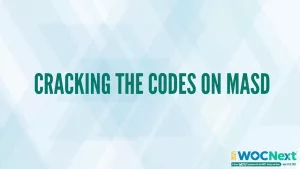The Wound, Ostomy, and Continence Nurses Society™ (WOCN®) today announced that its application for new ICD-10-CM diagnosis codes for Moisture-Associated Skin Damage (MASD) has been approved by the ICD-10 Coordination and Maintenance Committee and will take effect on October 1. As a result of the Society’s strategic initiative, these codes will improve patient care and outcomes, resource allocation, clinician education, data collection, and facilitate research.
MASD is a complex condition that, when coupled with a shift in demographics towards an aging population and unspecified diagnosis codes, has placed a significant burden on patients and the health system. The WOCN Society responded to this need by applying for ICD-10-CM codes specific to MASD conditions related to irritant contact dermatitis. The new codes include:
- L24A0 Irritant contact dermatitis due to friction or contact with body fluids, unspecified
- L24A1 Irritant contact dermatitis due to saliva
- L24A2 Irritant contact dermatitis due to fecal, urinary or dual incontinence
- L24A9 Irritant contact dermatitis due friction or contact with other specified body fluids
- L24B0 Irritant contact dermatitis related to unspecified stoma or fistula
- L24B1 Irritant contact dermatitis related to digestive stoma or fistula
- L24B2 Irritant contact dermatitis related to respiratory stoma or fistula
- L24B3 Irritant contact dermatitis related to fecal or urinary stoma or fistula
While the current ICD-10-CM codes cover a variety of potentially irritating substances, they do not cover the clinically relevant and prevalent forms of MASD caused by exposure of the skin to a variety of bodily fluids. These forms of MASD are particularly prevalent among persons with acute, critical, and chronic conditions in multiple care settings.
“Without specific coding, clinicians cannot track a condition or conduct proper research or education, not to mention advocate for reimbursement,” said Mikel L. Gray, PhD, FNP, PNP, CUNP, CCCN, FAANP, FAAN, WOCN ICD-10 Task Force Chair. “It is mission-critical to patients and to the advancement of the practice that we have explicit ICD-10-CM codes. We are incredibly pleased that our proposal has been approved and this coding will now exist.”
The approval and implementation of these codes will establish nomenclature for accurate data capture of the diagnosis of MASD; encourage accurate documentation of the prevalence of these forms of MASD; facilitate research by defining terms for outcomes to be measured consistently; enhance clinician and healthcare provider education; and improve patient care via accurate and consistent reporting of the progress of their condition.
“The process of petitioning, applying, and gaining approval for these codes, during a global pandemic no less, was a major undertaking for everyone involved. This significant milestone adds to the legacy work of the WOCN Society,” said Dea Kent, DNP, RN, NP-C, CWOCN, WOCN President. “Thank you to our dedicated team and supporting organizations for helping us gain this approval and advance the practice of diagnosing and treating patients with MASD conditions.”
The WOCN Society’s proposal was supported by The American Academy of Dermatology Association, American Geriatrics Society, Dermatology Nurses Association, European Association of Urology Nurses, International Continence Society, National Pressure Injury Advisory Panel, The Society for Post-Acute and Long-Term Care Medicine, and World Council of Enterostomal Therapists.
 Want to take your education about these codes a step further?
Want to take your education about these codes a step further?
Watch the free CE course, Cracking the Codes on MASD, originally presented at WOCNext 2021.


